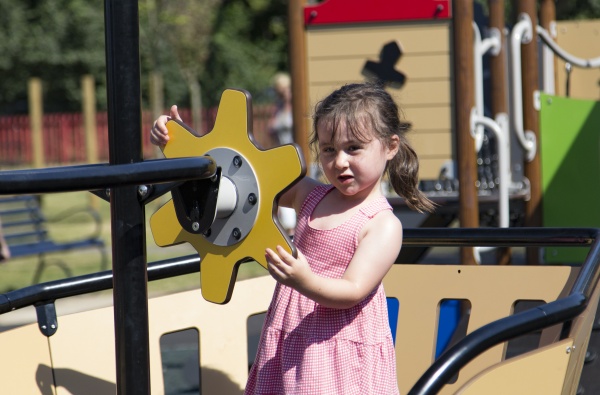Fair city sharing - what can urban planning contribute?
Our cities have grown over centuries. This also reflects the history of urban society, i.e. who was in charge, which professions were accessible to whom. A city is a multi-layered structure:...


YOUR FORUM FOR PLAY, SPORTS UND LEISURE AREAS

It is in particular the children in our society who are certainly suffering most from the current Covid-19 pandemic. The closure of day-care centres and schools, the ban on contact with friends, the ban on sports in clubs, closed recreational facilities and general social distancing - all these factors put an immense strain on our children in their everyday lives. Negative effects on a psychological, physical and social level can already be seen now and will certainly increase significantly in the future. Damage to personal development due to lack of physical activity, lack of social contact with other children and lack of balance to everyday life can show their effects long after the lockdown restrictions. Therefore, it is extremely important to counteract these consequences early on in order to avoid physical and mental health deficits in our children in the long term.
In the course of the pandemic, the importance of play and exercise areas for our children has become apparent. Play, sports and physical activity are elementary parts of everyone's life, they bring joy and have positive effects on our physical health and on our mind and psyche. Playing and moving in children's playgrounds promotes the cognitive, social and physical skills of the youngest members of society and also health prevention. It is important that children can visit safe places where they can meet peers. Children need to be able to move freely and interact socially and physically with other children. It is above all the playgrounds that have always been and still are the most suitable places to do so. Hence, they must be available, safe and open to the public. In times of the pandemic restrictions, open play and exercise areas in the outdoor space are and were the only places where children can leave the Covid-19 daily routine behind and find sufficient options for physical activity and social get-togethers. This balance is essential for daily life. The importance of play and exercise areas is therefore indispensable for children's everyday lives – in other words: playgrounds are systemically relevant for our children.
Current news: The World Health Organisation (WHO) has issued new activity recommendations for different population groups. While the guideline gives clear specifications for the optimal duration and intensity of physical activity, the WHO emphasises that "for health, every physical activity counts". At least 150 minutes of physical activity a week for adults. "Physical activity of all types and durations can strengthen health and well-being, but more is always better," says Rüdiger Krech, Director of Health Promotion at WHO.
For children and adolescents (5 to 17 years), the new guideline sets an activity target of at least 60 minutes a day. According to the WHO, time spent sitting is one of the biggest health risks and should be reduced as much as possible or compensated for by sufficient activity. "If you have to spend a lot of time sitting, for example at work or at school, then you should move more to counteract the harmful effects of sitting," says Mr Krech.
Playground@Landscape asked decision-makers from politics, science and business for their opinion on the role of children and physical activity in our society by raising the following question:
Are playgrounds systemically relevant?
Dr Susanne Eisenmann, Minister for Education, Youth and Sports of Baden-Württemberg:
"Play, sports and exercise are relevant for a healthy development of children and young people. Playgrounds and exercise areas promote physical activity and are therefore important for the development of young people.
After all, life offers less and less natural opportunities for physical activity. This makes it all the more important to convey the joy of movement and to encourage people to become physically active. In playgrounds, children become actively and intensively engaged with themselves and their environment. In this way their ability to understand and cope with everyday challenges is strengthened.
Children develop their identity and personality through play. They get to know their strengths and abilities, but also their limits, develop numerous skills and abilities as well as social and linguistic competences. They also learn about their environment and expand their knowledge.
That is why one of the incentives in day-care centres is the playground. Here, too, the educated and trained pedagogical staff support the children in free play.”
Yvonne Gebauer, Minister for Schools and Education of the State of North Rhine-Westphalia:
"Physical activity is an essential part of a holistic education. In early childhood, children experience and learn about their environment through physical activity. In this way they learn to test themselves and their bodies. Until the onset of puberty, and sometimes even beyond, children have a strong, natural urge to move. Whenever and wherever children are given a chance to move, they usually take advantage of it, be it in the schoolyard, on playgrounds or in other open spaces. In an increasingly technological and digitalised environment, movement, especially in childhood, also creates occasions and opportunities for building real and social relationships and thus contributes significantly to health promotion."
Bernhard Hoppe-Biermeyer, Member of Parliament of the Federal State of North Rhine-Westphalia, Chairman of the Sports Committee:
"Children's playgrounds or exercise areas are systemically relevant because many children don’t have the privilege of living in an apartment building with a garden, a private room full of toys and with parents who are willing or able to afford the sports club fees. A playground can be used free of charge and regardless of financial situation, education, social position - even more, it can bring together the most diverse groups. In this period of crisis and lockdown, there is definitely a risk of infection in a crowded playground, but for many children it is the only alternative to come into contact with their peers due to the absence of school, the interruption of club sports and the risk of infection in closed rooms. And then it is better to have contact in the fresh air, where the risk of infection is much lower than within one's own four walls.“
Wolfgang Jörg, Member of Parliament of the Federal State of North Rhine-Westphalia, Chairman of the Committee for Family, Children and Youth:
"Children: Unbridled curiosity and an energy-intensive urge to move!
The question of the systemic relevance of individual members, population groups or even occupational groups of our society is misleading. If we distinguish between relevant and non-relevant this will only lead to more division in our society. All people living in our society are relevant. Children anyway. They are our future. Therefore, we must support them in their natural development as much as possible and make space available for them. The unrestrained curiosity to discover the world, for example, is such a natural development. Children want to know everything very precisely. Sometimes they are annoying for that. They ask again and again. But they don't want to annoy anyone, they just want to learn. The unrestrained urge to move is also a natural development. Children don't walk from A to B. They run. They constantly try out the strengths of their bodies and train them through play. To do this, they need space to move. The nearby forest, the open meadow, and of course, also the playground around the corner. Physical activity, climbing, meeting peers is also the motor of children's mental development. They want to touch and grasp everything. Playgrounds are an important place in this respect, contributing to the good development of our children.“
Uwe Lübking, Councillor for Legal Affairs, Social Affairs, Education, Culture and Sports, German Association of Towns and Municipalities:
"From my point of view, the term "systemically relevant" is problematic, although we will not go into this topic now. It was inevitable to address and protect the so-called vulnerable groups first in the context of the pandemic. However, the needs of children and adolescents seemed and still seem to have been overlooked. The negative health and psychological consequences of a lack of daily exercise, especially for children and adolescents, are well known. According to reports, children and adolescents have become more lethargic and aggressive due to the lack of social contact. The pandemic exacerbates development according to which physical activities are neglected in many families. Especially children from socially disadvantaged families often have less incentive to exercise and do sports in their leisure time. They prefer to spend time in front of the TV, on the computer or with their mobile phones. This makes it all the more important to have sufficient opportunities for physical activity close to home. The Covid-19 crisis is proof of the importance of outdoor activity for large sections of society. I therefore hope that the experiences with the pandemic will increase the sensitivity for the lack of opportunities for physical activity, play and sports for our children and young people. I also hope that this will raise awareness of how important it is for the healthy development of young people's personalities to be able to gain sufficient experience in sports, games and movement. We are all called upon to ensure that there are sufficient opportunities for play, sports and physical activity in the living environments of young people, from playgrounds and opportunities for physical activity in parks to sports facilities. This does not always require great efforts in terms of personnel or finances. Sometimes the creativity of people is enough to help children and adolescents to meet their needs for physical activity.”
Prof. Dr Renate Zimmer, Professor of Sports and Movement Science at the University of Osnabrück. Founder of the initiative Active Childhood ("Bewegte Kindheit" ):
"Are children's playgrounds systemically relevant? If there is anything good about the pandemic crisis, it is the appreciation of spending time in the fresh air. People have always known that playing outside is healthy and strengthens the immune system. But now we have a new additional argument: viruses have less chance of spreading outside, the risk of infection is reduced.
But outdoor play also needs places that children like to go to, places where they have opportunities to practise their motor skills, to test their own limits, to meet other children with whom they can play together and with whom they can share the joy of free movement. Children learn by imitating, trying out and practising – to do so they need above all other children who are behavioural models for them. They need equipment and materials on which they can test their strength and which challenge them. They need places that are designed according to their needs for sensory experience and self-determined movement.
This includes our children's playgrounds: They are places of encounter and places of physical activity - indispensable in cities for children to grow up healthy. And therefore absolutely systemically relevant.”
Graduate engineer and landscape architect Yvonne Göckemeyer, Association of German Landscape Architects (bdla):
"Movement is essential for children's physical and mental development. Since today's living environment usually no longer offers informal play areas in the form of trees to climb, streams to build dams, etc., children's playgrounds and movement areas are very important. Here, children can, for example, live out their urge to move, go on a voyage of discovery, gain social skills, outgrow themselves and thereby strengthen their self-confidence. All this is essential for healthy development. Playgrounds are in any case systemically relevant.“
Dirk Schelhorn, LS2 Landscape Architects and Consulting Engineer at Schelhorn Lukowski Schnabel PartG mbB:
"Playing is a fundamental right for children and an important part of human rights. Outside the front door is the most important development space for growing up healthily. In order to move freely, to stay slim, to learn to think well. And not to be among the 33 percent of German children who are too fat and/or suffer from diabetes.
However, these open spaces have almost got lost in the past 50 years due to urban densification and the expansion of traffic roads. Thus our "children's playgrounds reserves" are often the last chance for them to retreat and of utmost social importance.
The pandemic has emphasised this importance based on the connection between healthy lifestyles and accessible, usable open spaces.
It is thus imperative that playgrounds and play areas have to be preserved, promoted and considerably expanded so that children can be children. This social mandate must be reflected in political budgets.
However, holes in the fence and puddles in the street can wait as long as our children are healthy and happy."
Bettina Schilling, Spielplatztreff.de (playground meeting point):
"Children learn to understand the world through free play. For this, they need safe places where they are welcome. Places that offer them attractive opportunities to test and expand their own abilities and limits and to play with other children. Children's playgrounds are such places and definitely systemically relevant! Therefore, in the future, we need even more determination to design playgrounds that actually meet our children's needs."
Franz Danner, German Technical Inspection Agency, TÜV SÜD Product Service Ltd:
"Are playgrounds systemically relevant? Yes, playgrounds are without a doubt systemically relevant! Especially in times of a global pandemic with its massive restrictions, incentives for movement, fresh air and physical challenges are indispensable! This is the only way to reduce the negative consequences of the intensive media use, lack of exercise and frustration at least a little bit. Unfortunately they cannot be fully compensated! “
Ute Eckardt, German Conference of Heads of Garden Authorities (GALK), Chair of the Working Group "Playing in the City":
"Yes, playgrounds are systemically relevant. It is a truism that play and exercise are indispensable for the healthy development of children. If school routes and school sports, excursions and trips, club sports and the recreational use of sports facilities are impossible, the already high importance of green spaces and playgrounds grows even more. Everyone could observe this in the last few months. It was also to be experienced that the children and accompanying persons mostly adhered to rules and were happy about every possibility of using green open spaces. Especially in socially deprived neighbourhoods, there is a lack of alternative spaces. In cities, playgrounds are the substitute for the missing natural space, where children can try things out, learn social skills, movement patterns and risk assessment, without being exposed to unnecessary dangers. They are therefore just as important as everyday goods or medical rehabilitation.
Those who care about the healthy development of children and social balance must keep playgrounds available, keep them open, invest in equipment and counteract the increased pressure of use with qualified maintenance. We must not save on playgrounds, especially now, if liveable and child-friendly cities are to have a future.“
Holger Hofmann, Federal Director of the German Children's Fund:
"No other age group is so urgently in need of protected public spaces that guarantee them age-appropriate recreation and stimulating exercise. The playground promotes a healthy physical, social and mental development of children. In playing with others, children learn to move competently, they learn to make social contacts, to behave in larger groups, to assert themselves, to value rules and to develop self-confidence through borderline experiences. Playgrounds are also important meeting places for parents and grandparents. Due to the restrictions in the pandemic, freedom of movement and contact with other children are particularly limited. Thus a special sense of proportion is needed when it comes to opening and maintaining playgrounds. In densely populated areas, for example, the use of playground patrons should be encouraged in order to improve the situation with regard to distance and hygiene.”
Tilo Eichinger, 1st Chairman of the Federal Association of manufacturers of playground and leisure areas (Bundesverband der Spielplatzgeräte- und Freizeitanlagen - Hersteller e.V.) and Managing Director of eibe Produktion + Vertrieb GmbH & Co. KG:
"The pandemic has revealed the importance of public and freely accessible play and exercise spaces for children. Especially in a pandemic like the one that keeps us in suspense today, play, sports and exercise become elementary components of everyone's life. In addition to the social promotion of children, playgrounds will always have positive effects on the psyche in a pandemic. It is therefore important that children and young people can go to places geared to their needs by meeting other children and young people there. Children and young people need to be able to move around casually and interact physically and socially with other children. Play and movement areas are such areas that have always been designated for this purpose.
The pandemic particularly affects families with children in conurbations who live in cramped living conditions. Therefore, the BSFH demands: Playgrounds must be available and open. In times of lockdown, open outdoor play and exercise areas were and are the only places where children can leave the stresses of everyday problems behind them and find sufficient opportunities for exercise and social interaction. This balance is elementary for daily life.
The Federal Association of Playground Equipment and Leisure Facility Manufacturers thus finds that playgrounds and exercise areas are of utmost importance for children's everyday lives. There is no alternative, they are indispensable. Hence playgrounds and exercise areas are systemically relevant for our children and young people.“